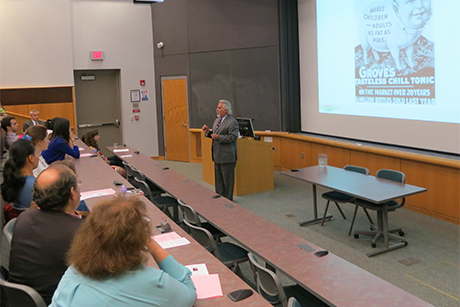Expert dishes on nutrition trends
By Sarah Cutler

"Supermarket guru” Phil Lempert urged Cornellians to find new ways to consider and communicate food trends in a “challenging” food world. He was on campus to deliver the second annual Joyce Lindower Wolitzer ’76 and Steven Wolitzer Nutrition Seminar Oct. 1.
Lempert, one of America’s leading consumer trend-watchers and analysts, asked audience members to picture a “huge, big, gray elephant” before asserting that trends in nutrition are elephants.
“They’re big, and they’re lumbering – gluten-free, high-fiber, whatever the trend of the moment is,” said Lempert, who has served for more than 20 years as a food trends editor and correspondent for the “Today” show, authored several books and in 1994 founded SupermarketGuru.com as an resource for health and food information.
“We run after that elephant, take our arrows of PR, marketing, social media and let them fly, but it makes no difference – the elephant keeps going,” he said. “We need to get in front of that elephant, dig a big hole and capture it.”
Nutrition information, he said, must be interesting and accessible to consumers, whose needs are constantly evolving.
“For most consumers, nutrition is kind of boring. You’re telling me everything I’m doing wrong, that I’m going to die a slow, painful death because of fat, sugar and sodium,” Lempert said, adding that nutrition information must help empower people.
As for trends, Lempert said he anticipates the decline of supermarkets – “we’ll see less products, not more” – and, thanks to the iPhone, changes in acquiring, storing and making food.
He said the trend of eating locally grown foods is “one of the most interesting trends” he’s seen in a long time. But “local” isn’t sustainable everywhere, and the term can be deceptive, he cautioned.
“I have a new definition of ‘local’ – it’s on the planet,” Lempert said. Increasingly, consumer focus is shifting from “local” to “locale,” with people becoming more interested in where their food comes from.
When it comes to getting information about health and nutrition, Lempert credited first lady Michelle Obama with “pushing the envelope” on making health and obesity part of national discourse and with getting children involved in planting the White House garden.
But Lempert said that he was angry about inconsistent nutrition labels and concerned about the how the Internet is the No. 1 trusted source for health information.
“Half of everything you read on the Internet about health is wrong, but you don’t know which half,” he said. “Until we can get a standard and empower people to read labels, we’re in trouble.”
The lecture attracted many nutritional sciences students, but also alumni, including Linda Byard ’68. “I am not a student of food, but I am certainly a consumer,” Byard said. “If I know what the food industry is trying to market to me, both the ‘how’ and the ‘why,’ then I can make more informed purchasing decisions.”
Lempert’s talk was hosted by the Division of Nutritional Sciences and the Health and Nutrition Society undergraduate organization.
Sarah Cutler ’16 is a student communications assistant for the College of Human Ecology.
Media Contact
Get Cornell news delivered right to your inbox.
Subscribe